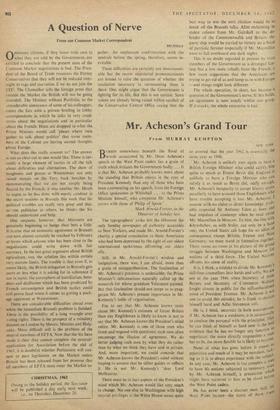A Question of Nerve
From our Common Market Correspondent
BRUSSELS
What does this really amount to? The answer is not so clear-cut as one would like. There is cer- tainly a large element of tactics in all the talk about difficulties and alternatives. The show of toughness and gloom at Westminster not only raised morale on the Tory back benches by demonstrating that we are not simply being fleeced by the French; it also enables Mr. Heath to argue as he has done with manly candour in the secret sessions in Brussels this week that his political troubles are really very great and that, as one politician to others, he thinks the Six should understand and help.
One suspects, however, that Ministers are genuinely beginning to hedge their bets a little. It is true that an economic agreement in Brussels can now almost certainly be reached by February at terms which anyone who has been close to the negotiations could write down with fair accuracy. In the last great argument about British agriculture, too, the solution lies within certain very- narrow limits. The trouble is that even if, as seems likely, the British delegation in Brussels gets more or less what it is asking for in substance if not in name, the atmosphere of humiliation, bore- dom and disillusion which has been produced by French intransigence and British tactics could still prove fatal when it comes to getting a pack- age approved at Westminster.
There are considerable difficulties ahead even when the immediate Brussels problem is finished. I here is the possibility of a long wrangle over ming rights. There is the prospect of a minatory descent on London by Messrs. Menzies and Holy- oake. More difficult still is the problem of the neutral members of EFTA. Now that the Six have made it clear they cannot complete the neutrals' application for Association before the end of 1963, it is doubtful whether Parliament will con- sent to pass legislation on the Market unless Britain has been released from her promise that all members of EFTA must enter the Market to-
gether. An unpleasant confrontation with the neutrals before the spring, therefore, seems in- evitable.
These difficulties are certainly not insurmount- able but the recent ministerial pronouncements are bound to raise the question of whether the resolution necessary to surmounting them is there. One might argue that the Government is fighting for its life. But this is not certain. Siren voices are already being raised within earshot of the Conservative Central Office saying that the
best way to win the next election would be to break off the Brussels talks. After reclaiming its stolen colours from Mr. Gaitskell as the de- . fender of the Commonwealth and Britain. the party ship would be carried to victory on a flood of patriotic fervour (especially if Mr. Macmillan were to fall overboard one dark night).
This is no doubt regarded at present by most members of the Government as a deranged fan- tasy but a few more rebuffs from the French. a few more suggestions that the Americans are trying to get rid of us and lump us in with Europe —and things might look different.
The whole operation, in short, has become a question of the Government's nerve, If this holds, an agreement is now nearly within our grasP. If it cracks, the whole enterprise is lost.


































 Previous page
Previous page